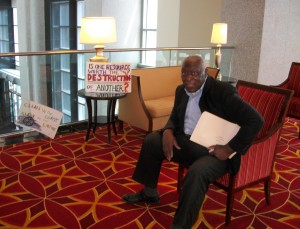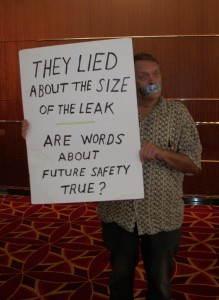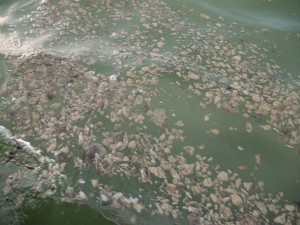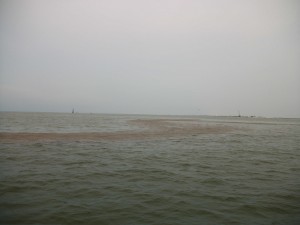| Today the U.S. Bureau of Ocean Energy Management held a public “forum” in Mobile on whether the six-month moratorium prohibiting new drilling should be suspended early. The purpose of the moratorium is to allow for renewed consideration of oil well safety reforms, oil spill containment issues, and oil spill recovery and response strategies. While Steve Russell, a representative from the Mobile Chamber of Commerce, was given a prominent speaking role, no Mobile area environmental leader was allowed to speak at the “forum.” Steve Russell provided the audience a simplistic the-wells-are-safe and we-need-jobs message asking for a halt to the moratorium and asking for increased drilling. His lack of appreciation for the magnitude of the current problem and his lack of appreciation for the ongoing safety and environmental issues were appalling.
The one speaker from an environmental organization, Manley Fuller of the Florida Wildlife Federation, insisted that the current general plans for oil spill catastrophes be beefed up to include worst case scenarios such as oil spill recovery efforts complicated by major hurricanes and simultaneous oil catastrophes. Representing the State of Florida well, he restated Florida’s stance against any new drilling near Florida. In other highlights, Dr. Edward Overton, an LSU professor, stated that “the booms were not particularly effective” and the coordination of clean-up efforts were characterized by a “lack of nimbleness.” Dr. George Crozier of the Dauphin Island Sea Lab questioned the use of dispersants in deep water and spoke of “profound uncertainties” connected with that use. To further our knowledge of the gulf, Dr. Crozier asked for deep water research tools that would enable research in the gulf waters at depths of 3000 feet and more where we have insufficient scientific knowledge. David Underhill appeared outside the room wearing duct tape over his mouth succinctly symbolizing the lack of public participation allowed at the forum. The audience was not allowed to even ask questions and was told to remain silent at all times. If you would like to express your opinion to the U.S. Bureau of Ocean Energy Management, you may submit your opinion at http://boemre.gov/forums . In my own comments, I underscored the importance of clean environmentally friendly energy sources that could also provide area jobs and not further jeopardize numerous community jobs such as the jobs currently lost in fishing and tourism. |
Author Archives: Leo Denton
Citizen Rain Water Tests in Louisiana Show Unsafe Levels of Toxins
Many people, including Kindra Arnesen and the Coastal Heritage Society of Louisiana, are doing great work in Louisiana. The video below with Kindra speaking from the August 5, 2010 Buras Town Hall Meeting about the gulf oil catastrophe is powerful and informative. The video includes the importance of bio-remediation as well as the serious problems with toxins in the environment including the rainwater. The level of denial shown by the official (see the 9:15 point of the video onward) who Kindra speaks with is also illustrative of what many face when trying to realize common sense care for the gulf.
Uncertainty
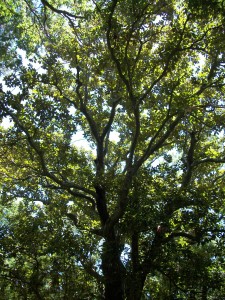
Very close to the gulf shoreline, this grand magnolia tree in the Dauphin Island Audubon Bird Sanctuary has stood the test of life’s many uncertainties and storms, photographed July 27, 2010.
To say that we live in uncertain times is an understatement. Did the rapidly decaying oil (see previous two posts) contain recently applied dispersants? People, who know far more than I, say it’s likely, but we don’t know that and perhaps we never will. But right now I want to say something about uncertainty and action.
Life is filled with uncertainties. So what are we to do? If I wait for certainty, I will have procrastinated too long and my gifts, how I can contribute, will be wasted.
Two months ago, I woke up with a very compelling thought, “Just do the basics and progress will follow.” We don’t need to understand everything; we’re not in charge; we just need to show up and do what we can well.
As difficult as uncertainties can be, certainties can be dangerous, “The oil wells are safe.” Uncertainty that leads to inaction can be just as dangerous. In contrast, appreciating how much we don’t know can keep us alert and spur our creativity and action.
Thus uncertainty is ultimately about courage – courage to do what we should do, following the basics of who we are, even when it means not knowing where our actions will lead us. Curiously this kind of uncertainty sounds a lot like living faith.
Oil Collected North of Dauphin Island Rapidly Disappears in Glass Jars
In my previous post, I showed pictures of LOTS OF OIL just off the Dauphin Island beaches (two of those pictures are included below). At that same time, I collected two samples of the oil and provided them to scientists. But before I gave them the samples some very strange things happened. The first sample included several clogs of oil and about a cup of seawater from an area of surface oil like the picture on the left. The second sample was gathered from an area of dense surface oil like the picture on the right. The oil collected in the second sample was very liquidy and contained very little seawater. I collected the samples around 5:45 P.M., August 4 (yesterday). By noon of the following day (today), dramatic changes had taken place in both samples. By noon, the water with the clogs of oil had turned clear, and the clogs of oil had either dissolved or evaporated and were no longer visible. By noon, there were just a few black granules at the bottom of the jar. In another strange development, also by noon, the oil in the second container had lost over half its volume (the glass jar which was filled to the brim was mostly empty). Both jars were closed with lids.
Larger original photographs used in this and the previous post:

